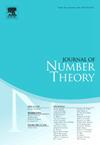Zeros of Dirichlet L-functions on the critical line
IF 0.6
3区 数学
Q3 MATHEMATICS
引用次数: 0
Abstract
In this paper, we estimate the proportion of zeros of Dirichlet L-functions on the critical line. Using Feng's mollifier [8] and an asymptotic formula for the mean square of Dirichlet L-functions introduced in [7], we prove that, averaged over primitive characters and conductors, at least 61.07% of the zeros of Dirichlet L-functions lie on the critical line, and at least 60.44% of the zeros are simple and lie on the critical line. These results improve upon the work of Conrey, Iwaniec, and Soundararajan in [6].
求助全文
约1分钟内获得全文
求助全文
来源期刊

Journal of Number Theory
数学-数学
CiteScore
1.30
自引率
14.30%
发文量
122
审稿时长
16 weeks
期刊介绍:
The Journal of Number Theory (JNT) features selected research articles that represent the broad spectrum of interest in contemporary number theory and allied areas. A valuable resource for mathematicians, the journal provides an international forum for the publication of original research in this field.
The Journal of Number Theory is encouraging submissions of quality, long articles where most or all of the technical details are included. The journal now considers and welcomes also papers in Computational Number Theory.
Starting in May 2019, JNT will have a new format with 3 sections:
JNT Prime targets (possibly very long with complete proofs) high impact papers. Articles published in this section will be granted 1 year promotional open access.
JNT General Section is for shorter papers. We particularly encourage submission from junior researchers. Every attempt will be made to expedite the review process for such submissions.
Computational JNT . This section aims to provide a forum to disseminate contributions which make significant use of computer calculations to derive novel number theoretic results. There will be an online repository where supplementary codes and data can be stored.
 求助内容:
求助内容: 应助结果提醒方式:
应助结果提醒方式:


